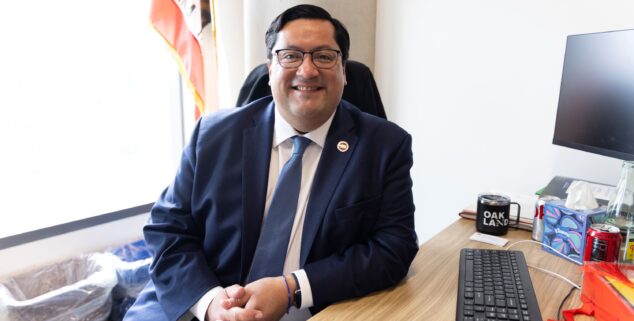Capitol Spotlight
Capitol Spotlight: Freshman Sen. Jesse Arreguín
 Sen. Jesse Arreguín. Photo by Ellie Appleby, Capitol Weekly
Sen. Jesse Arreguín. Photo by Ellie Appleby, Capitol Weekly Jesse Arreguín became Berkeley’s mayor just as Donald Trump first took the White House.
Now, as the Democrat enters the California Senate representing District 7, he’s preparing to face similar challenges on a bigger stage after defeating Democratic Socialist Jovanka Beckles for the seat formerly held by termed-out Nancy Skinner.
His mayoral tenure was a crucible of crisis management.
“It was a very difficult, chaotic, unpredictable time and our city, our state, were under attack, our residents were under attack,” Arreguín said, recalling how he had to contend with white supremacist provocateurs fighting in Berkeley’s streets, responded to Donald Trump’s “Muslim ban,” and joined other San Francisco Bay Area leaders in issuing the nation’s first Covid-19 stay-at-home orders.
In the last year, he navigated increasingly contentious city council meetings as protesters demanded support for a Gaza cease-fire resolution, which he and other council members rejected. Arreguín continued imploring protesters to “be civil.”
Arreguín, 40, the son and grandson of farmworkers, was raised in San Francisco, where his family faced eviction amid the first tech boom, which eventually led him to roles on Berkeley’s Housing Advisory Commission and later on the Rent Stabilization Board, which strengthened protections for renters – an ongoing priority for him.
As possibly the most liberal member of the liberal Berkeley city council for three terms before he became mayor, Arreguín initially opposed major building projects and housing density, but later came to understand that building more housing was essential not just for potential new residents, but also for protecting existing housing.
“I’m not afraid to say that I was wrong,” Arreguín said. “What I saw was increasing gentrification and displacement in my community. … And while that is true, the fundamental reason why there’s such a housing challenge is the scarcity of housing.”
That realization led him to champion what he calls “the biggest building boom in Berkeley in decades” – 7,000 new units, including the controversial development of People’s Park for student housing.
Emilie Raguso, a longtime Berkeley reporter who now runs the online news site Berkeley Scanner, observed his transformation firsthand. She said he won over skeptics by brokering compromises, being accessible and deeply researching issues that came before him.
“I still am an unabashed progressive, but what I am committed to is getting things done….That means you have to build coalitions, even with Republicans. People in California want action, they want to see action, they want the cost of living to come down.”
“I thought that was impressive to watch. Because some people were concerned that he would be too liberal and then he also got pushback from the more progressive people,” she said. “Berkeley was really lucky to have a mayor like him. He really balanced the issues in a community that is really tough to govern.”
As a freshman senator and chair of both the Public Safety and Human Resources committees, Arreguín has proposed three bills so far: SB 9, which would eliminate owner-occupancy requirements for accessory dwelling units; SB 91 a proposal that would bar health care workers or hospitals from sharing information about their patients with immigration authorities; and SB 63, co-authored with Sen. Scott Wiener (D-San Francisco), which would authorize a transportation bond to support struggling Bay Area transit agencies.
“I still am an unabashed progressive, but what I am committed to is getting things done,” he said. “That means you have to build coalitions, even with Republicans. People in California want action, they want to see action, they want the cost of living to come down.”
His priorities reflect both immediate crises and long-term challenges: Building new affordable housing, preserving existing affordable units, addressing homelessness and protecting California’s immigrants from unprecedented deportation threats under the second Trump administration.
Arreguín brings hard-won experience in homeless policy to Sacramento. As mayor, he witnessed the lack of coordination between state, county and local governments.
After the Supreme Court ruled in favor of homeless sweeps, he implemented them in Berkeley, ultimately reducing the city’s unsheltered population by 45%. He said he will push the state to adopt clear metrics on the outcome of the billions of dollars spent each year to address homelessness.
As California faces both an affordability crisis and renewed federal tensions, Arreguín said he is ready to again step up for California.
“We’ve got to stand for who we are as a state. But it’s going to be hard,” he said.
Juliet Williams is the former Northern California News Editor for the Associated Press in San Francisco.
Want to see more stories like this? Sign up for The Roundup, the free daily newsletter about California politics from the editors of Capitol Weekly. Stay up to date on the news you need to know.
Sign up below, then look for a confirmation email in your inbox.

Leave a Reply